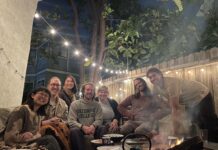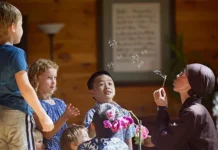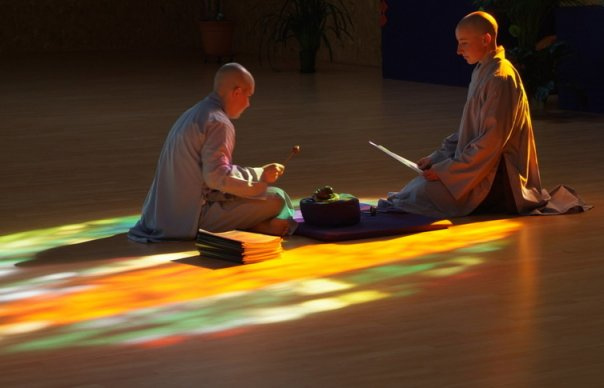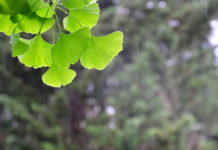LIVING MY DREAM – A RESPONSE TO THE BAT NHA KOAN
Dear Beloved, Respected Thay,
I ask permission to share my initial insights on Thay’s Bat Nha Koan.
In Thay’s room in Lower Hamlet, when Thay asked Hien Nghiem to ensure politicians, governments, journalists and human rights campaigners received the koan as something for their own hearts and aspiration – and not as work, or a development in the story, Hien Nghiem couldn’t see a way to do it.
I know their world of dismissive, high-speed, practical expediency; and I also know our world of openminded, patient, wholehearted reflection. I love and trust Thay totally, but I just couldn’t see how the two worlds could ever fit together. I believe Thay perceived my consternation, and am grateful for Thay’s compassion in teaching me there and then.
Thanks to Thay’s guidance, I saw that the first obstacle was that even I hadn’t taken the koan for myself. Right away, I’d seen it as part of an external objective reality: it was a challenge, it was work. But listening to Thay, after some time I was suddenly able to touch a space of non-striving – of embracing acceptance, stillness and confidence. Thay helped me to see that the koan wasn’t out-there on a piece of paper, but that I was already in it, and right there in it with me was everyone – the policemen, the senior government officials in Vietnam, the Buddhist Church monks and international political community. We’d gone through the koan to a clear, intimate place of peace, forgiveness, compassion and fellowship.
There was nothing to attain, and nothing separated us. In this vast still space, I was the police officers. They were as close to me as Thay was, sitting right there – if not closer: in my heart. They were not kicking and fighting, they were just being. And since they were just ‘being’, my own hardness and struggling at them just fell away – I was just being, there with them, too. Deeply, nothing separated us: my enmity, my anger, my tough righteousness fell away and I was humbled. My heart softened and compassion bloomed.
It just happened to be that I ended up being here doing this, and they ended up being there doing that. Their mental formations, habits and wrong perceptions are mine; the difference is just historical-dimension context. I am so lucky to be in a practice centre, with a sangha, with the precepts, in the slipstream of virtuous ancestors and a wise and compassionate Teacher. They happen to be somewhere else, in unfavourable conditions where the very same weaknesses as mine play out so differently and so dreadfully.
I ask myself, Why am I this nun here, and not that pointing young woman there, in the video of the December mob? She has the same age, dedication and determination. I feel compassion for her, pity even, and I feel that I’m very lucky. But deeply I know that there is no right and wrong; that I am not more right, nor more lucky. She is still being true to something, just a different something in a different world. I am sure her own, communist, ’sangha’ is grateful to her; I am sure she feels she has ’succeeded’. But deep down I know that with such passion and commitment, she must have the very same ideals for the good, the true and the beautiful as I do. I realize that I shouldn’t ask, “Why do I have the luck to be me, not her?”, but instead see that I am her, there, as well as me, here.
Seeing that, I see that I must live this life well for her. Each day I could live as an offering to her. How many days do I really make the most of these conditions to transform our shared mental formations? I am chastened, humbled, shamed: I haven’t been diligent enough even with the good conditions I have. The task of practice, healing and transformation is urgent – I have the chance, I must do it.
I have been able to see that the koan is not an object, a product to be distributed, but a gateway to the ultimate truth of our deep intimacy, our deep interbeing. As such it is infinitely powerful, indestructible, all-embracing. The koan is not a move in a game that might succeed or fail, but something revealing an absolute truth that already is. I am the police officers, I am that young woman, whether I see it or not. The governments, politicians and journalists are in the koan, inter-are with one another and with me, and are as much the police officers as I am, whether they see it or not, whether they receive the koan in the ‘right way’ or not.
Realizing all this, I had faith in the koan’s power and knew that everything is possible. Who am I to think it’s not possible? Who am I to be an obstacle, withholding from others their chance to see the truth? I had the courage to accept Thay’s request. I knew I must try.
???
How many days do I live my dream?
Plum Village is also a Bat Nha. Plum Village will also become a legend. How is my own diamond seed of awakening doing? Am I living each day in Plum Village’s Pure Land of practice wakefully, freely and with ease? Every day of growth is precious; the diamond seed will not always have this greenhouse. Do I live each day as the beautiful expression it is of my innermost aspiration?
During Tet 2006 I asked the Oracle, “Do I have the strength and capacity to realize my dreams?”, and the Oracle (and Thay) said “Yes”. But the Koan’s alternative question wakes me up even more fiercely: “Do I have enough courage and intelligence to face my own weaknesses?” That is the real question. I must face them, embrace them and transform them every day. It’s the weaknesses that are standing between me and my dreams, and the way to realize my dreams is to face them, one by one, with love and intelligence.
I am already living my dream. Did I notice that today?
???
I have so many more questions from the koan that stay with me day and night, but have not shared them here because I see I don’t yet have clarity or insight on them. I promise to write to Thay when they ripen.
In deep gratitude and respect,
and with love,
Your student,
con Hien Nghiem


















